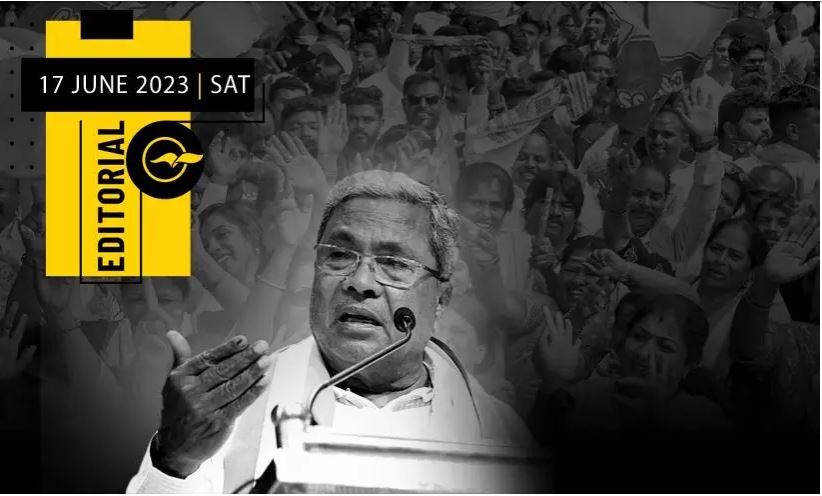
The Karnataka model
text_fieldsThe Siddaramaiah-led Congress government in Karnataka has swiftly fulfilled three significant election promises within less than a month of assuming power. During a cabinet meeting held recently, a decision was made to withdraw the controversial Religious Conversion Prohibition Act, which had been implemented by the previous BJP government. Law and Parliamentary Affairs Minister H.K. Patil announced that a bill would be passed during the upcoming budget session in the first week of July. Additionally, the cabinet has resolved to rectify the sections included in textbooks by the BJP government as part of their saffronization agenda. Government sources have indicated that the Agricultural Produce Marketing Committee (APMC) Act, known for its detrimental impact on farmers, will also be repealed. These decisions reflect a strong and resolute political declaration rather than a mere reactionary response, as Siddaramaiah stated when the election results were announced, emphasizing that it marked a victory for democracy over hate politics.
The Sangh Parivar considers Karnataka a laboratory for their divisive communal politics in South India. Their reprehensible acts, witnessed in Gujarat, Uttar Pradesh, Madhya Pradesh, and repeatedly during the BJP's rule in Karnataka, have had a significant impact. Under Chief Minister Basavaraj Bommai's tenure, the saffron party conducted fervent political experiments, including the introduction of the Prohibition of Religious Conversion Act in September of last year. This law encompassed all forms of conversion, leaving room for broad interpretations of any conversion as "forced conversion," and imposing severe penalties, including up to 10 years of imprisonment. Detentions of individuals involved in such "crimes" had commenced even before the law officially took effect.
Naturally, minorities became the primary victims of these cases. Another facet of these experiments manifested through the saffronization of textbooks. Following the NCERT model under the central government, extensive alterations were made to Kannada textbooks. Lessons on RSS founder K.B. Hedgewar and Hindutva ideologue V.D. Savarkar found their way into the syllabus. Moreover, the Sangh Parivar-controlled education department even included texts derived from hardline Hindutva proponents like Sulibele, known for their hateful articles. In response to these issues, the Congress party in Karnataka took a resolute stance. When the Prohibition of Religion Bill was introduced, Congress members protested by walking out of the House and vociferously labelling the law unconstitutional. The party also voiced their opposition to the textbook and hijab-related issues both inside and outside the House. Notably, when the elections were announced, Congress demonstrated the courage to declare an end to these political experiments, differentiating itself from the past.
While it remains unclear how the Siddaramaiah government intends to withdraw the Prohibition of Religion Act, the steps taken thus far undoubtedly signify a significant stride forward. This firm stance was similarly reflected in the handling of textbooks. Hindutva-related lessons were omitted, and instead, new texts were introduced, featuring figures such as Savitribai Phule, a poem by Dr B.R. Ambedkar, and a chapter on Jawaharlal Nehru's letter to his daughter Indira Gandhi. The government has also recommended the reading of the Constitution's Preamble before commencing classes in schools. Such exemplary actions should not be confined to the Congress party in Karnataka; the central leadership must be prepared to adopt a robust defence against Hindutva fascism, transforming it into a nationwide struggle. It is the Congress party's susceptibility to falling into the trap of soft Hindutva on such occasions that often lands them in trouble. Let us remain hopeful that Karnataka will lead the way in this regard.























